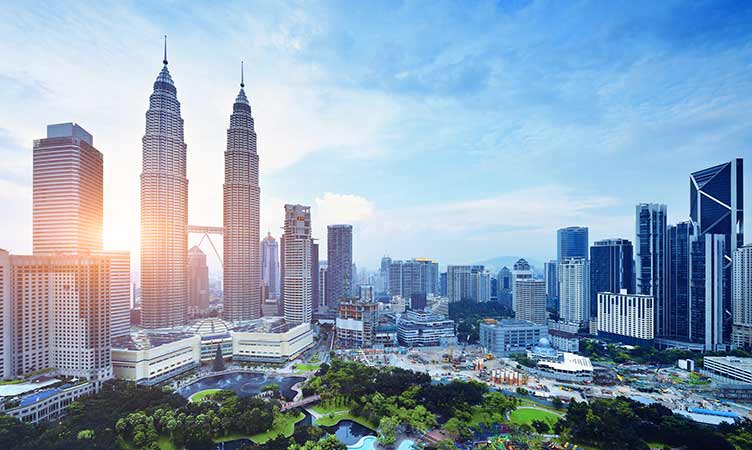Living and working in Malaysia
We understand that relocating for a new job is a big decision. If you’re thinking about relocating to Malaysia to work with RCSI, there are a number of services provided to ensure the relocation process is as smooth and stress-free as possible.
The following is useful information to be aware of, but more detailed, specific information and advice on all aspects of the relocation process can be provided by RCSI’s HR department.

There are excellent healthcare facilities throughout Malaysia, with specialist centres in major cities and a large number of private clinics and dentists. All Malaysian residents are eligible for the medical care and services provided by government clinics and hospitals. Foreign nationals employed by Malaysian companies are usually eligible for public healthcare, but are charged higher rates.
Work visas and permits are required when relocating to work in Malaysia and the requirements for obtaining the relevant authorisation can vary depending on the length of stay in the country.
Although the expatriate population is increasing in Kuala Lumpur, expatriates are encouraged to familiarise themselves with local Malaysian customs and practices. Business days are generally Monday to Friday, 9am-5pm, and English is widely used to communicate in business.
Malaysia has a relatively low income tax rate and few other taxes. This lower tax structure represents a significant benefit of working in Malaysia for expatriates.
In order to open a bank account in Kuala Lumpur, expatriates must have a valid work permit. There are several international banks in operation in the Kuala Lumpur. Opening a bank account will require:
- A valid form of identification (passport, etc.)
- Proof of permission to reside in Malaysia temporarily or permanently (tourist visas are not accepted)
The typical tenancy is usually for one or two years and rent is usually paid monthly. The tenant is usually responsible for legal fees to cover the drafting of the tenancy agreement. A security deposit of two months’ rent is required. An ‘Earnest Deposit’ equivalent to one month’s rent must also be paid in order to secure the property; this amount will be credited towards the first month’s rent.
A utility deposit of half a month’s rent will also be required in order to ensure the utility bills are paid when vacating the property. Rental agreements are reviewed after every term of tenancy. Air-conditioning is required for much of the year and is usually standard in expatriate properties. Utility charges are always separate from the rent and are payable by the tenant. Newly arrived expatriates tend to avail of staying in a short-term, serviced apartment while trying to source long-term accommodation.
Malaysia has an equatorial climate, with uniformly high temperatures and rain at all seasons.
Annual rainfall varies geographically, usually falling in short, sharp thunderstorms. The days are sunny, hot and humid, with temperatures reaching 33°C. At night, temperatures fall to 24°C, although it is cooler at higher altitudes.
The official language is Bahasa Malayu (Malay), although English is widely used in commerce and industry.
Roads in Malaysia are generally of a reasonable standard. However, traffic jams are common in Kuala Lumpur as multi-lane highways merge in to narrow roads. Drivers and pedestrians should beware of the many motorcyclists, known for weaving in and out of traffic. There are good public transport options (rail and bus) and many expatriates choose to avail of these options or to hire a car with a driver.
The unit of currency is the Malaysian ringgit (MYR), divided in to 100 sen.
The following denominations are in circulation:
- Notes: 1, 5, 10, 20, 50 and 100 MYR
- Coins: 5, 10, 20 and 50 sen
Although the official religion in Malaysia is Islam, freedom of worship is guaranteed under the Constitution. Malaysians are tolerant of other faiths and expatriates are not expected to adhere to Islamic traditions, however, respect should be shown towards local customs and practices, particularly during holy times, such as Ramadan.
Malay food typically uses a blend of spices, ginger, coconut milk and peanuts, but each region has its own special or traditional foods.
Kuala Lumpur, and Malaysia in general, has a diverse variety of restaurants and food available – ranging from all-day hawker centres, food courts and coffee shops to fine-dining restaurants, there really is something to suit all tastes. There are also plenty of international eateries and restaurants available.
Malaysia, and specifically Kuala Lumpur, has a broad range of shopping options. In Kuala Lumpur, you will find over 60 shopping centres and a range of markets selling local crafts, textiles and fabrics.
For entertainment, there are a number of sports, fitness and social clubs in Kuala Lumpur offering a wide range of activities.
